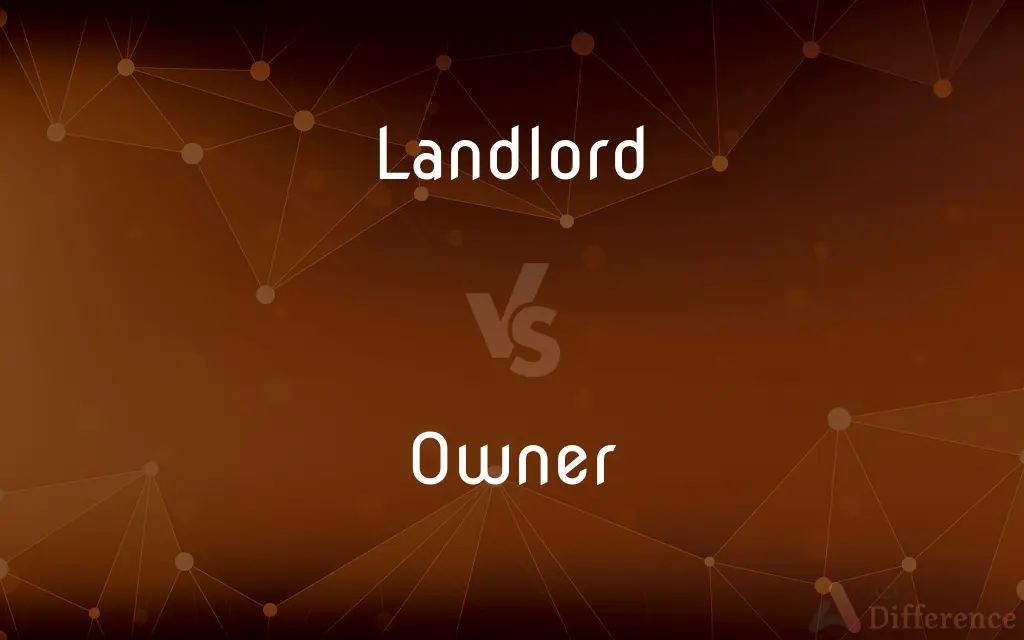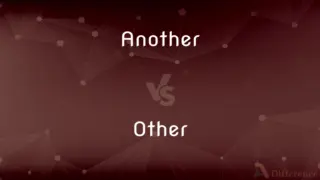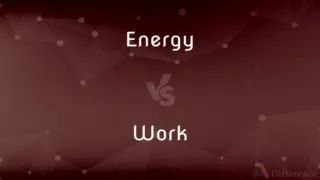Landlord vs. Owner — What's the Difference?
By Tayyaba Rehman & Maham Liaqat — Updated on March 21, 2024
A landlord leases property to tenants, while an owner holds the title to property, which may or may not be leased.

Difference Between Landlord and Owner
Table of Contents
ADVERTISEMENT
Key Differences
Landlords specifically engage in renting out property to tenants, implying an active role in property management and tenant relations. They are responsible for maintaining the property, ensuring it's habitable and safe, and addressing tenant concerns. For example, a landlord must promptly repair a leaking roof in a rented apartment to comply with lease agreements and housing laws. On the other hand, owners hold legal title to property, which encompasses broader rights than just leasing, such as selling, using, or modifying the property. An owner might live in their property, develop it, or use it for various personal or commercial purposes, beyond just renting it out.
While all landlords are technically property owners, not all owners are landlords. This distinction highlights the specific role landlords play in the real estate market, which involves leasing and tenant management. For instance, an individual owning a vacation home they only use for personal vacations is an owner, not a landlord. Conversely, when they rent out this home to others for short-term stays, they assume the role of a landlord, taking on responsibilities like ensuring the home is clean and functional for guests.
The legal obligations and rights differ significantly between landlords and owners, particularly regarding tenant interactions. Landlords are bound by lease agreements and tenant laws, which dictate terms like rent collection, eviction processes, and property maintenance. For example, a landlord must follow specific legal procedures to evict a tenant, which are dictated by local laws. Owners, in the absence of rental agreements, are not subject to these specific tenant-related laws but still adhere to general property laws and regulations concerning ownership, zoning, and usage.
The financial dynamics for landlords and owners also vary, especially regarding income generation and tax implications. Landlords generate income through rent and may benefit from tax deductions related to property depreciation, maintenance, and improvements. An owner not engaged in renting might not have the same continuous income stream from the property but could benefit from capital appreciation over time. Moreover, the tax implications for a non-rental property can differ, focusing more on property taxes and potential capital gains taxes upon sale.
The relationship with the property is another differentiating factor. Landlords have a business-oriented relationship, viewing the property as an investment and a source of income. They might not have a personal attachment to the property and are more focused on its profitability and maintenance in a tenantable condition. Owners, especially those not renting out their properties, may have a more personal connection, viewing the property as a home or a personal asset, which influences their decisions regarding the property's use and development.
ADVERTISEMENT
Comparison Chart
Role
Rents out property to tenants.
Holds legal title to property.
Responsibilities
Maintenance, lease management, tenant relations.
Varies widely; can include living in, selling, or developing the property.
Legal Obligations
Bound by tenant laws and lease agreements.
Subject to property and ownership laws.
Income Generation
Generates income through rent.
May generate income through rent, sale, or not at all.
Relationship with Property
Business-oriented, focused on investment and maintenance.
Personal or business, depending on use and intention.
Compare with Definitions
Landlord
An individual or entity that rents out property to tenants.
The landlord fixed the broken window in the tenant's apartment.
Owner
Holds legal title to property, with broad rights including usage and disposition.
The owner decided to sell the property for a profit.
Landlord
Responsible for maintaining the property in a habitable condition.
Landlords must ensure all utilities are in working order.
Owner
Not necessarily involved in day-to-day management if not renting.
The owner is renovating the property to increase its value.
Landlord
Generates income primarily through collecting rent.
The landlord collects monthly rent from the tenants.
Owner
May or may not engage in renting out the property.
The owner uses the property as a personal vacation home.
Landlord
Engages in lease agreements and tenant management.
The landlord provided a new lease agreement for review.
Owner
Relationship with the property can be personal or business-oriented.
The owner has a personal attachment to the ancestral home.
Landlord
Bound by specific legal obligations towards tenants.
Landlords must follow legal procedures for eviction.
Owner
Financial dynamics can vary, from personal use to investment.
The owner enjoys capital appreciation over the years.
Landlord
A landlord is the owner of a house, apartment, condominium, land, or real estate which is rented or leased to an individual or business, who is called a tenant (also a lessee or renter). When a juristic person is in this position, the term landlord is used.
Owner
A person who owns something
Restaurant owners
The proud owner of a huge Dalmatian
Landlord
A man (in legal use also a woman) who rents out land, a building, or accommodation.
Owner
Of or belonging to oneself or itself
She makes her own clothes.
Landlord
One that owns and rents land, buildings, or dwelling units.
Owner
That which belongs to one
I wanted a room of my own.
Landlord
A man who runs a rooming house or an inn; an innkeeper.
Owner
To have or possess as property
Owns a chain of restaurants.
Landlord
A person that leases real property; a lessor.
Owner
To have control over
For a time, enemy planes owned the skies.
Landlord
The owner or manager of a public house.
Owner
To admit as being in accordance with fact, truth, or a claim; acknowledge
"I own that I have been sly, thievish, mean, a prevaricator, greedy, derelict, / and I own that I remain so yet" (Walt Whitman).
Landlord
A shark, imagined as the owner of the surf to be avoided.
Owner
To make a full confession or acknowledgment
When confronted with the evidence the thief owned up to the crime.
Landlord
The lord of a manor, or of land; the owner of land or houses which he leases to a tenant or tenants.
Owner
One who owns something.
The police recovered the stolen car and returned it to its owner.
Landlord
The master of an inn or of any form of lodging house; as, the landlord collects the rents on the first of the month.
Upon our arrival at the inn, my companion fetched out the jolly landlord.
Owner
The captain of a ship.
Landlord
A landowner who leases to others
Owner
One who owns; a rightful proprietor; one who has the legal or rightful title, whether he is the possessor or not.
Owner
(law) someone who owns (is legal possessor of) a business;
He is the owner of a chain of restaurants
Owner
A person who owns something;
They are searching for the owner of the car
Who is the owner of that friendly smile?
Common Curiosities
What defines a landlord?
A landlord is defined by their role in renting out property to tenants and managing those rental agreements and properties.
Can an owner be a landlord?
Yes, an owner becomes a landlord if they rent out their property to tenants.
Do landlords have to follow special laws?
Yes, landlords must comply with tenant laws and regulations, which dictate their interactions with tenants and property management practices.
How do owners generate income from their property?
Owners can generate income through rent (if they are landlords), selling the property, or through its appreciation over time.
What rights do owners have over their property?
Owners have broad rights, including using, selling, developing, or renting out their property, subject to legal regulations.
Are landlords always individuals?
No, landlords can be individuals, partnerships, or corporations that own and rent out property.
Is every property owner a landlord?
No, not every property owner is a landlord; this role is specific to those who rent out their property.
Can landlords sell their rented property?
Landlords can sell their property, but they must adhere to the terms of the lease agreements and tenant laws during the sale process.
What happens if a landlord wants to use the property for personal reasons?
The landlord must comply with lease terms and tenant laws, possibly needing to wait until the lease ends or negotiate with tenants.
What responsibilities do landlords have?
Landlords are responsible for property maintenance, adhering to lease agreements, and managing tenant relations.
What motivates someone to become a landlord?
Individuals may become landlords for income generation, investment purposes, or to utilize property they own but do not use personally.
How do tax implications differ for landlords and non-rental property owners?
Landlords may receive tax deductions for rental-related expenses, while non-rental property owners face different tax considerations, such as property taxes and potential capital gains.
Can an owner live in their property and still be a landlord?
Yes, if they rent out part of their property, like a room or a separate unit, while living in another part.
Do owners need to inform tenants if they sell the property?
Yes, typically, tenants should be informed of the sale, and their rights and lease terms must be respected during the transition.
Can an owner change their mind about renting and choose to live in their property?
Yes, but they must adhere to existing lease agreements with tenants and follow legal procedures for any changes.
Share Your Discovery

Previous Comparison
Another vs. Other
Next Comparison
Energy vs. WorkAuthor Spotlight
Written by
Tayyaba RehmanTayyaba Rehman is a distinguished writer, currently serving as a primary contributor to askdifference.com. As a researcher in semantics and etymology, Tayyaba's passion for the complexity of languages and their distinctions has found a perfect home on the platform. Tayyaba delves into the intricacies of language, distinguishing between commonly confused words and phrases, thereby providing clarity for readers worldwide.
Co-written by
Maham Liaqat













































